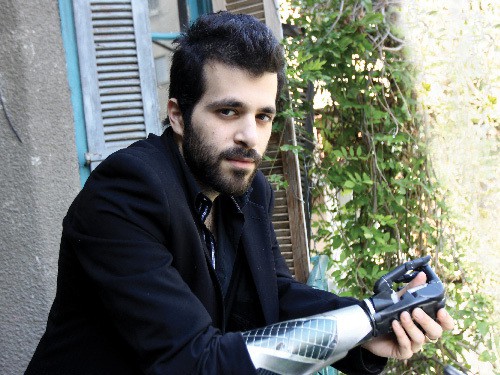“There’s not a single thing that a two-handed person can do that I can’t.”
Emanuel Aminof, 23, lost his right hand in a military exercise that went terribly wrong on January 13, 2010, in the Jordan Valley.
Three tanks training with infantry forces were simulating a takeover of an enemy outpost. Emanuel was serving as a loader. Unfortunately there were problems with the weapons system. Emanuel was in the Platoon Commander’s tank when the cannon got stuck and would not shoot the Vulcan mortars (powerful anti-aircraft missiles).
“While I was extracting the mortar from the cannon, an explosion occurred. I remember lying inside the tank, and I heard the call for my urgent evacuation. As soon as my Commander began medical treatment, I realized how badly injured I was. I had lost my right hand.
“I was helicoptered to Hadassah Hospital and immediately underwent amputation surgery. Weeks later, I was still not healing properly. I required another operation, amputating more of my arm.

Emanuel developed his own robotic hand in conjunction with an industrial designer from The Bezalel School of Art and Design.
“Until my injury, I had only served for 10 months. I had bonded with my comrades, experienced a few combat situations and held positions along the Jenin perimeter in the West Bank. Ironically I worked especially hard so that I could join the Armored Corps—I wanted team work.”
Emanuel will not let this disability affect his life. In conjunction with an industrial designer from The Bezalel School of Art and Design, he developed his own robotic hand. Emanuel is able to go mountain trekking, wall climbing and has traveled in China and New Zealand. He has learned to write with his left hand, and today teaches bartending.
Emanuel maintains a positive attitude, despite the fact that he still suffers daily.
“I need to wear either a hook or a bionic hand at all times, because it is practical and also protects me. Without this protection, I experience a lot more pain, the constant feeling of electricity running through my arm and terrible pressure boils. Due to these after-effects, it is really hard to function and doing even the simplest task can be excruciatingly painful.
“I’m not angry at anyone. I recall those dreadful moments and know that I could have died. Now I look forward to each day and continuing my recovery and rehabilitation at Beit Halochem in Tel Aviv.”
Beit Halochem assists the wounded from the time they are injured and for the rest of their lives. Visiting the newly disabled in the hospital is the start of their rehabilitation.
“When Lt. Ziv Shilon lost his hand in October 2012 to an Improvised Explosive Device during a Gaza border patrol, I visited him since we had similar disabilities. There are not many of us who lose hands, and I wanted to share my experiences with Ziv. The one bit of advice that I gave him was to get a robotic hand, which he now wears. This was a type of closure for me. I remembered when I was in the hospital and people from Beit Halochem came to visit and cheer me up.”
Emanuel’s message of courage and hope is real for the more than 58,000 disabled veterans in Israel. He knows that Beit Halochem is there to help each step of the way in making life better.
